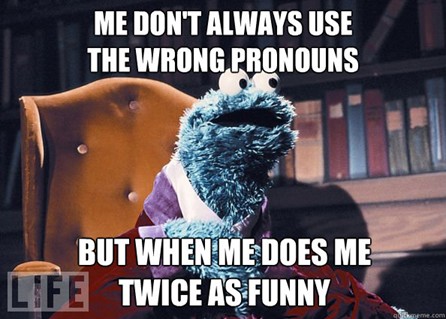That Really Bunches My Panties…by Brendon Marks

As a writer I have had it up to here with political correctness, but one problem in particular is trying to decide what to use in place of ‘he’ when there is an equal possibility of meaning ‘he’ or ‘she’.
I acknowledge use of ‘he’ where a reference could just as easily be referring to a ‘she’ does seem unfair. Ignoring the fact that whoever said life was fair, was wrong, let’s explore alternatives.
In most cases, using ‘he or she’ is acceptable, but is clumsy and using three words where one should suffice is wasteful. It might be better to remove the spaces and use ‘heorshe’, but that is more likely to be pronounced ‘hee-oar-sh’.
We can say ‘he/she’, usually pronounced ‘hee slash shee’, but that in itself isn’t totally correct. After consulting one dictionary the definition for the word ‘slash’ doesn’t mention the character separating ‘he’ and ‘she’. That character is a virgule, so if we are striving for correctness, the correct pronunciation is ‘hee virgule shee’. That’s silly. It almost sounds like ‘he’ did something to ‘she’ and I’m sure that’s not intended.
When writing about animals, unless referring to a specific gender, it’s incorrect to use ‘he’ or ‘she’. They’re always referred to as ‘it’. Wouldn’t it be just wonderful to replace all the ‘he/she’ (did you remember to say ‘virgule’ instead of ‘slash’?) references with ‘it’?
I have given the idea of new pronouns considerable thought. In this case I think it should be two characters, because I like short words. The second character should be ‘e’ to be consistent, the word should be easy to pronounce, and should not be a homonym for any other letter or word. My choice is ‘ye’, pronounced ‘yee’. The correct conjugation would therefore be ‘he, she, ye’ or if you prefer, ‘she, he, ye’.
I realize that ‘ye’ is an archaic form of the plural for ‘you’, but I don’t feel that would be confusing for most people, except at Christmas while singing “Oh, Come All Ye Faithful”. But in this case we could always change the title to be “Oh, Come All Faithful.” Or simply leave it the way it is and acknowledge the fact that ‘faithful’ is non-gender-specific as well.
If we establish ‘ye’ as a new pronoun, we must also deal with ‘his/her’. The most logical extrapolation is ‘hef’ or ‘heg’. I propose ‘hef’. Then, instead of writing ‘He/she must consider his/her options’, we could write ‘Ye must consider hef options’. It might take some getting used to, but don’t all new ideas?
Remember there is no formal process to follow to create a new word. There is no big committee somewhere taking requests for new words and voting on whether they’re used. All that is required is someone think of the word, assign it a definition and spread ‘the word’. If enough people start using the word, it will become a part of the language. Once that happens, people in England and Australia can decide how they want to pronounce it and we’ll be done.





